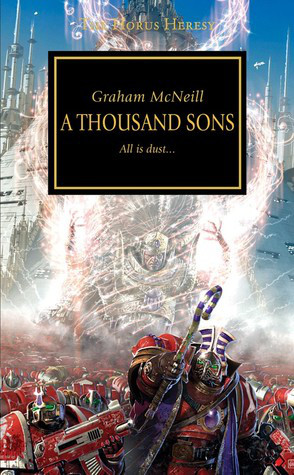
(Editor’s note: I’ve been doing a lot of reading in the 30k universe lately, and figured that I may as well throw my thoughts out there regarding some of the books I’ve read. I don’t really read them in any particular order; my book selection process consists of walking into the FLGS, browsing their collection and thinking “hey, I haven’t read this one yet and I’ve always wanted to learn more about X Legion”. The “Read” series will be a quick (spoilerless) review of each novel.)
A Thousand Sons by Graham McNeill is my most recent read, and I must say I quite enjoyed it more than I thought I would. I knew next to nothing about the Thousand Sons prior to the book, knowing little more than the fact that it was Magnus’ attempt to warn the Emperor of Horus’ betrayal that resulted in the Space Wolves being sent to bring him in. I must admit that I was a little more hesitant that I usually am when starting this book, as the Thousand Sons didn’t really interest me in the way that more dynamic Legions such as the Blood Angels or Sons of Horus do.
I was pleasantly surprised to find a well-crafted story that asked some interesting questions. Namely, do the ends justify the means? Do the intentions of the actor justify the means by which he reaches his goals? In the context of A Thousand Sons, is loyalty strong enough justification to use evil means to achieve noble goals?
I must admit that GW’s trailer for the Burning of Prospero box, as narrated by Ahriman, did a wonderful job of capturing of what made the Burning of Prospero so tragic – and McNeill captures the injustice of Prospero quite well in this book. Did the citizens of Tizca really deserve the destruction of their homeworld? Did the otherwise loyal Thousand Sons need to be broken for the well-intentioned decisions of their Primarch, especially considering Magnus’ significant regret over what he had done?
You may think it nobler to suffer your fate, but I will take arms against it.
–Ahriman
I was further pleasantly surprised to find myself rooting for the Thousand Sons, despite all we now know about their descent into Chaos and their present state in the 40k universe. They are the scholars and intellects who have built a glittering, wondrous city focused on learning and the arts – the Space Wolves are the savages at the door, and yet the Wolves are supposed to be the “good” guys. An interesting contrast from the traditional tropes, and I look forward to reading Prospero Burns to get their side of the story.
The book is a little long (one of the longer Heresy books I’ve read) and could have benefited from a little tighter editing, particularly in the first half of the book as it’s not until the Council of Nikea occurs that the action really picks up (and it was awesome to finally read an account of what happened there). And aside from Ahriman, the other Thousand Sons captains are relatively one-dimensional. But all these flaws are made up for by a well-written story of a Legion’s unwilling descent into heresy; proof that the road to Hell really is paved with good intentions.
Advertisements Share this:




